Craftivisim: Using creative energy to make a difference
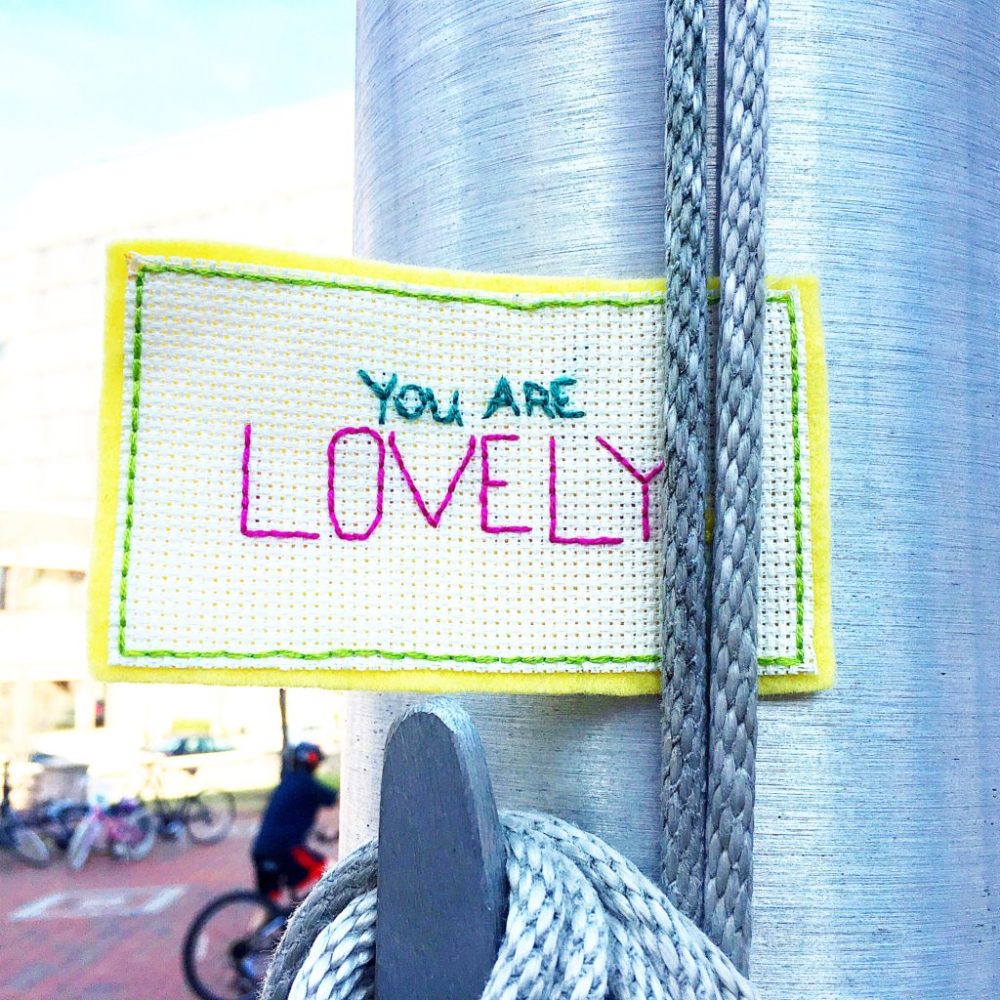
Betsy Greer ‘You are so very beautiful’ campaign
Stereotypically seen by the ignorant as a pastime for meek old ladies, crafting has a radical side: everything from sweary sewing to campaigning crafting (aka craftivism: ‘craft’ + ‘activism’). It’s a beautiful way to share your thoughts or say something valid about what’s going on in the world. And therapeutic, too – as Jenny Eclair found out on BBC4’s Craftivism programme. This weekend we’ll definitely be getting crafty:
Campaigning Crafting
Employing your creative skills for the greater good is an excellent way of getting a message across. It’s gentler, and more engaging and also versatile than traditional forms of protest, usable for everything from a personal crusade to a massive political protest – and there are numerous examples of its effectiveness. Betsy Greer coined the term ‘craftivism’ in 2003 and has defined it as: ‘a way of looking at life where voicing opinions through creativity makes your voice stronger, your compassion deeper and your quest for justice more infinite.’ In 2015 she began the ‘you are so very beautiful’ campaign, which asks people to create an affirmation starting with ‘you are…’, and leave it where someone will find it. (Many, including mine, are stitched, but it can take any form, eg a painted pebble.) Find out more HERE.
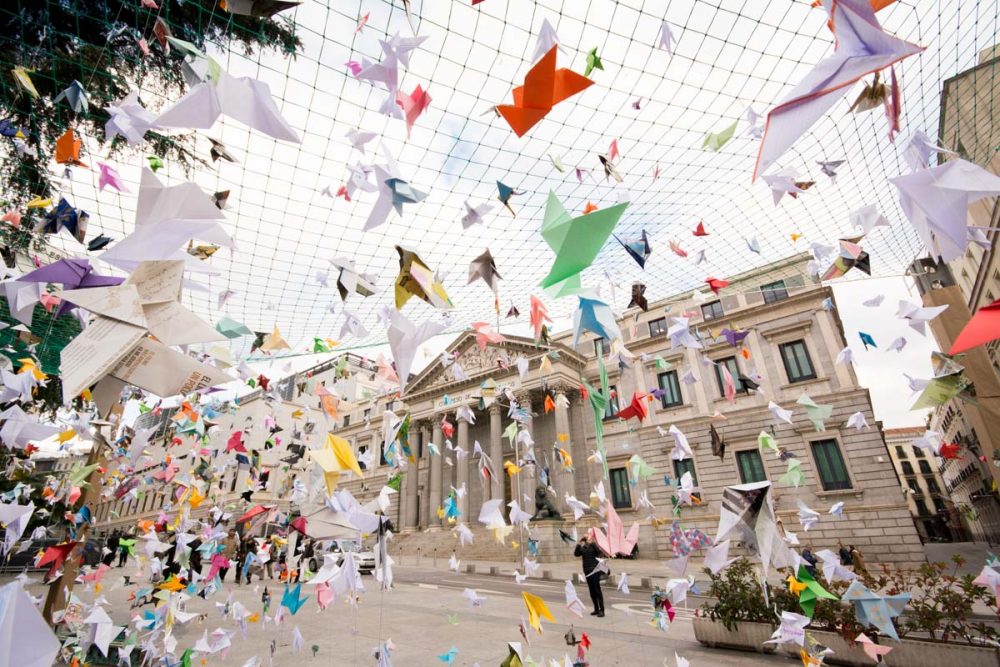
WWF’s #ORIGAMIMIGRATION Campaign – an origami initiative to protect migrant birds from dredging 2016
There are many examples of effective craftivism… whether for a global campaign, or much smaller in scale and closer to home, like during the first lockdown when my friend Justine knitted little rainbows to hang in her street as a tribute to the NHS and to bring a little joy to passers-by. Another friend is raising money for Patched Together a community project bringing isolated or vulnerable residents together to learn textile skills, in South London.
Last year the charity End Hunger UK sent MPs knitted or crocheted items of food to call for politicians to act to ensure everyone has enough to eat.
In 2015, The Craftivist Collective embroidered hankies for M&S board members to convince them to pay the living wage. Sarah Corbett, its founder, describes the collective’s work as ‘using craft to contemplate global issues, provoke thought and start conversations rather than arguments; to engage, empower and encourage people on and offline to become part of change in the face of injustice, inequality and prejudice.’
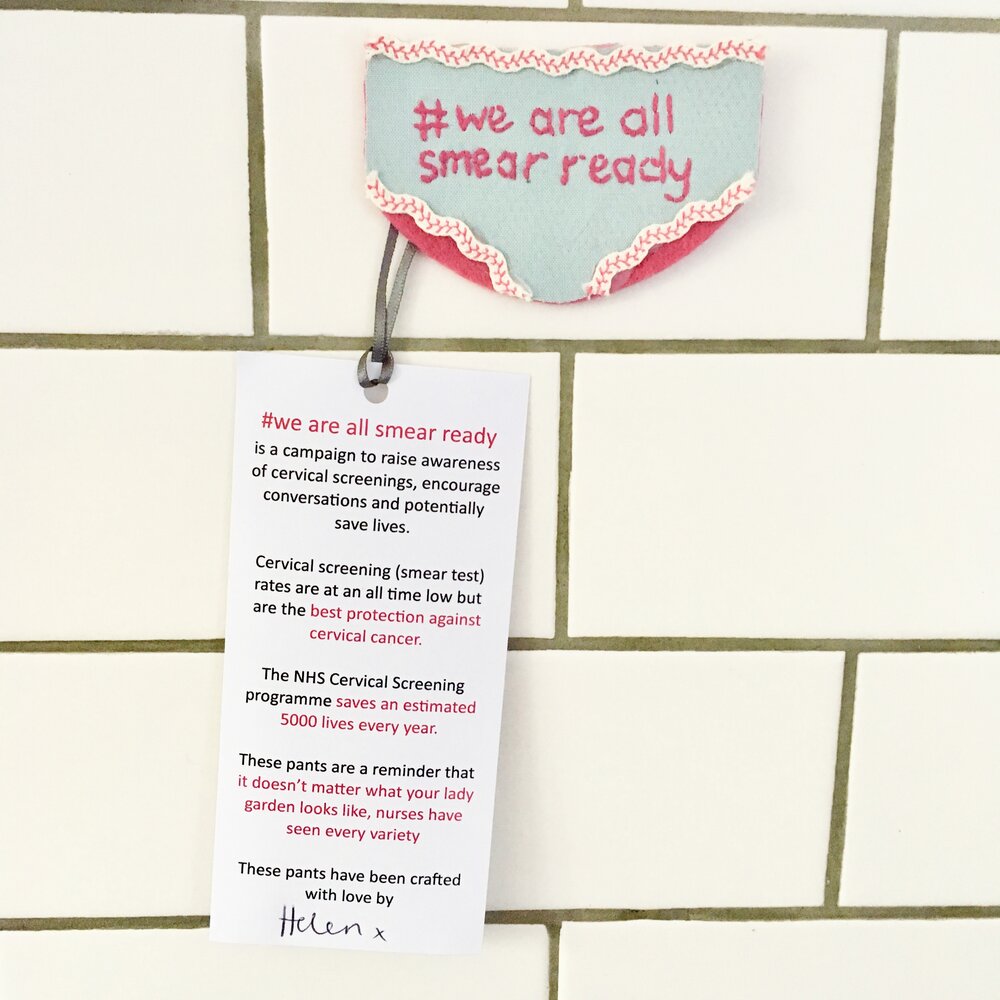
Helen Baker’s ‘smear ready’ campaign
The NAMES Project Memorial Aids Quilt comprised of 48,000 sewn panels commemorating the names of 96,000 people who have died of Aids, has been growing since 1987, and weighs an estimated 54 tonnes.
An alphabet crochet pattern has been created by Cincinnati’s craft-show organiser Grace Dobush for Black Lives Matter, to spell out names of those affected.
Approximately, 1-in-3 young women between the ages of 25-29 skip going for a smear test. In her #weareallsmearready campaign Helen Baker creates mini knickers, to promote going for a cervical smear, for Cervical Screening Awareness Week.
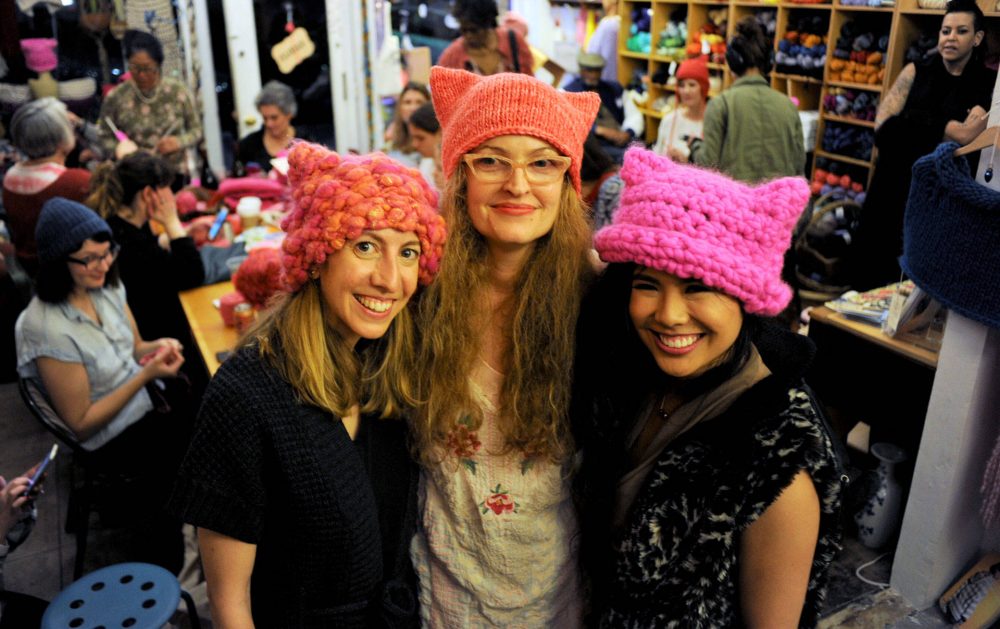
The Pussy Hat Project
Perhaps the largest craftivist action was the knitting of hundreds of thousands of pussy hats in January 2017, to wear on worldwide women’s marches protesting against Trump’s inauguration, and his misogynistic policies and views on women, like his infamous ‘Grab ’em by the pussy’ comment on approaching women. One (not mine) is now in the Victoria & Albert Museum.
Initially created and curated by the artist Diana Weymar as a cathartic act, Tiny Pricks Project recorded ex-president Donald Trump’s words by stitching them onto textiles. As she said on Instagram, ‘desperate times, creative measures.’

Sweary sewing*
Subverting pretty stitching by using it to spell out strong words, even if few people ever see them, is so satisfying. I was so exasperated by a moth infestation that I cross-stitched a message for them on a moth-repellent lavender bag. Swearing itself has many health benefits (as does crafting), from easing stress to relieving pain, and sweary sewing harnesses the twin benefits of creativity and swearing, doing twice the good! Even national treasure Dame Judi Dench has tried it. When she appeared in the play Amy’s View by David Hare in 1997, she embroidered him a cushion with ‘Fuck ’em, fuck ’em, fuck ’em’, referring to the theatre critics.
If you’re inspired to try it, Whitstable-based Profanity Embroidery Group (known as PEG) – described by Kathy Burke as ‘like a punk version of the WI’ – has downloadable embroidery kits on sale and free downloadable sweary templates.
Or Google alphabet templates and create your own message. If you’re into cross-stitch, you can use a pattern generator like this one. I can think of a few choice Covid-related phrases I’d like to commit to cloth…
*Any craft can, of course, be put to use: knitting, appliqué, weaving, glass-painting, candle-making…
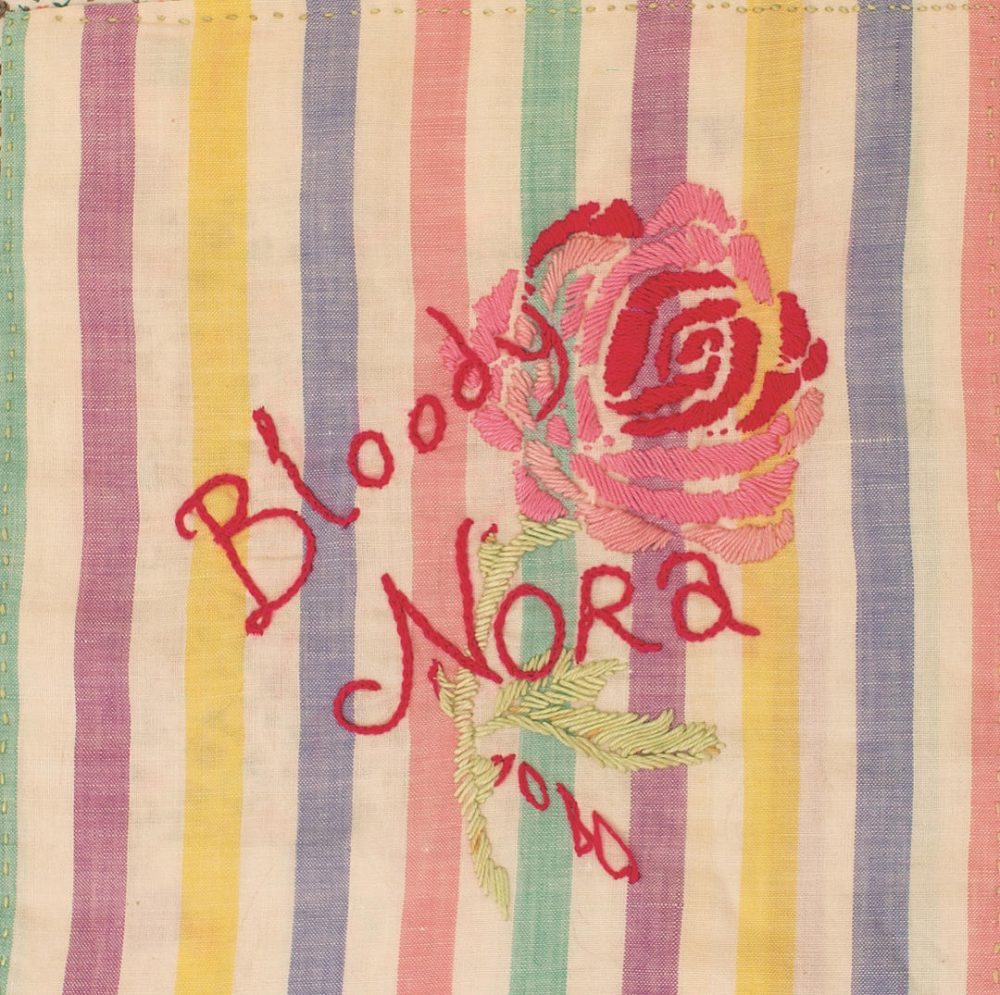
Craftivism: find out more
• Watch BBC Four’s Craftivism: Making a Difference with Jenny Eclair.
• Read How to be a Craftivist by Craftivist Collective founder Sarah Corbett (£10), or shop for craftivist kits
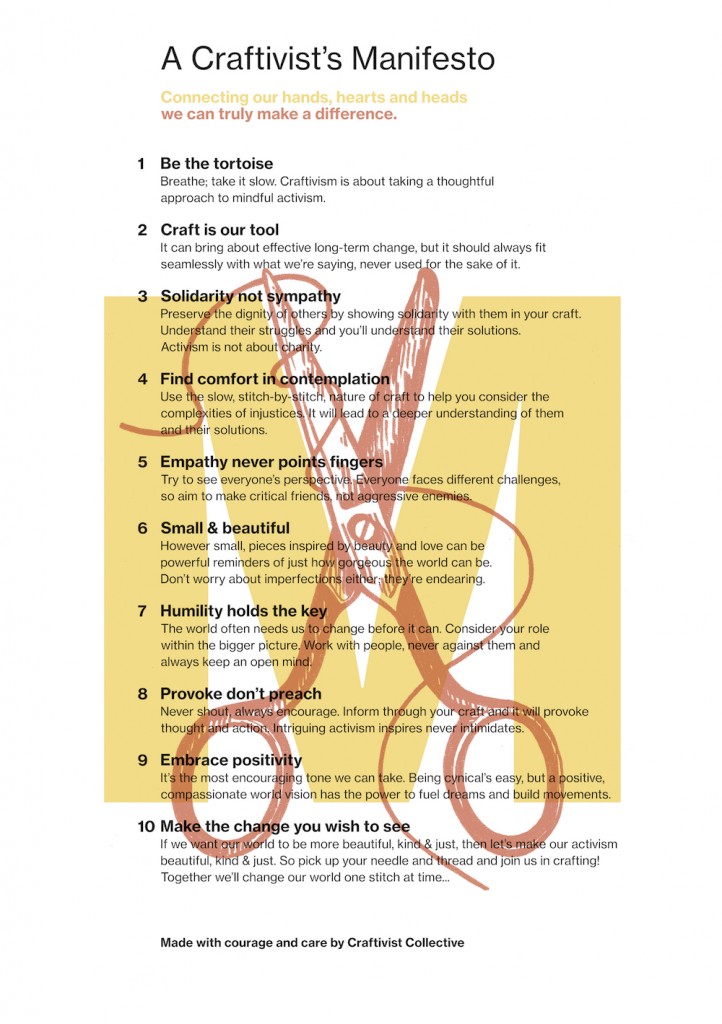
Adrienne Wyper is a health and lifestyle writer and regular TNMA contributor.
Re:
Profanity Embroidery Guild' I find that so very sad. I do understand the cathartic effect of swearing but surely part of therelease’ is the fact that it is not mainstream/everyday/normal behaviour? The very public use of such language eventually diminishes its effect, doesn’t it?I personally find the
F' word offence and most publications still use the asterisk when using it. By becoming much more mainstream doesn't it lose its impact e.g. Davina McCall's sweatshirt ? Brilliant idea but why the need to tell everyone tof***’ off? It’s a horrible thing to say to anyone.Yes – I am a certain age! [76yrs]